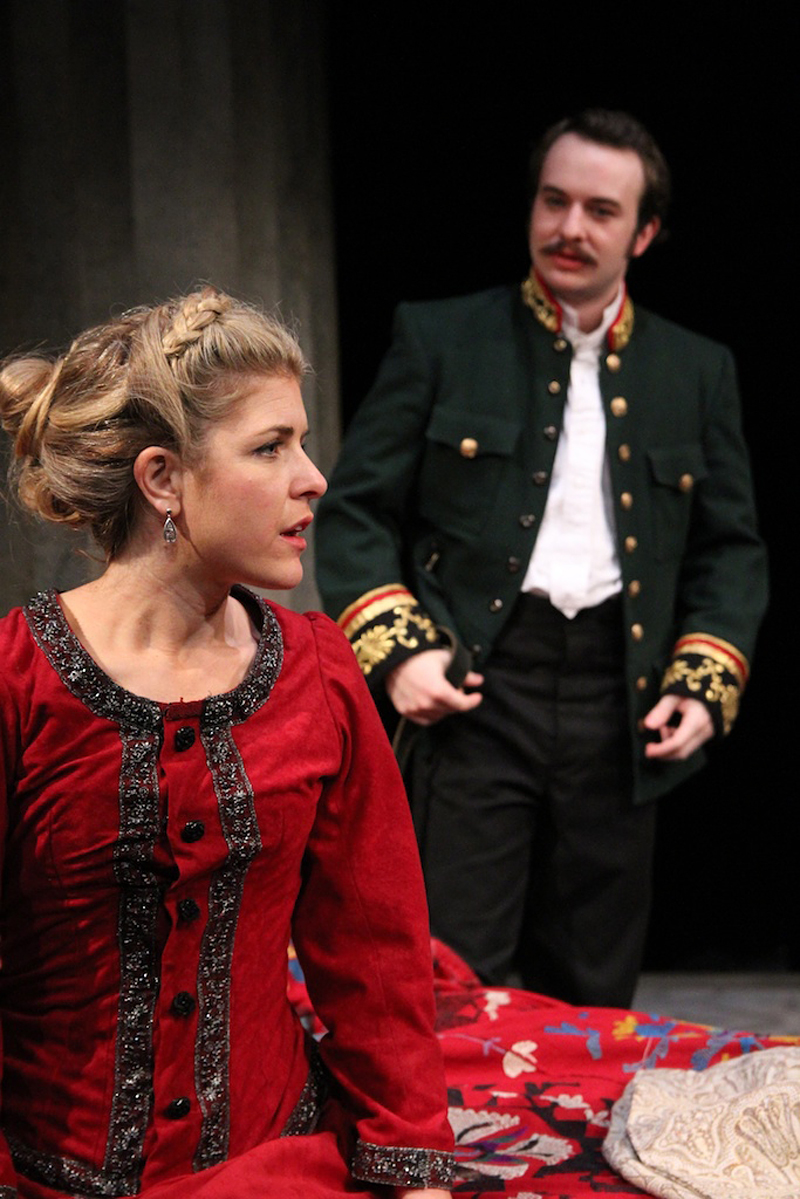A charming, unfulfilled wife, her fastidious, inattentive husband, and her obsessive, capricious lover. You know the story, set in decaying tsarist Russia. Tolstoy’s tragic tale has been adapted countless times (most recently with Keira Knightley). But adapters be warned: Unless you have something new to say about the majestic novel, keep out.Originally commissioned by Portland Center Stage, Kevin McKeon’s reduced Anna isn’t bad, once you’re past the annoying opening, when Anna (Emily Grogan) jarringly appropriates Tolstoy’s famous maxim that “All happy families are alike; each unhappy family is unhappy in its own way.”Through rotating expository text and sensible vignettes (some heavy-handed), we get the Anna/Vronsky/Karenin dynamic. This main plot is interwoven with that of proleristocrat Levin (David Anthony Lewis), his conflicted ideals (a more egalitarian, science-based society, etc.), and his attraction to the rich, conventional Kitty (Sara Mountjoy-Pepka). The subplot about Levin’s sick brother Nikolai never carries its weight in adaptations (how much consumptive choking do audiences want to watch?). Book-It could have cut Nikolai from this nearly three-hour production (though Bill Ritchie does a fine job in the role).Cast-wise, the love triangle works reasonably well. The pretty Grogan is a little undersexed for Anna, relying more on her Gibson-girl tragic eyes to do the seducing. Andrew DeRycke may be the priggiest Karenin ever portrayed (his order to Anna to come to bed—”It is time”—economically suggests a gallows march for her), and he enjoys some funny, oversized comments. By contrast, Scott Ward Abernethy’s Vronsky is gratifyingly underplayed, leaving him almost as much a cipher for us as for Anna. Less successfully, Anna’s supposedly pleasure-grubbing brother Stiva is portrayed by gaunt, careworn Evan Whitfield, who looks like more of a Levin. As Anna’s young son, Aaron Guthrie Sterne is heart-wrenching. The double-casting can be confusing, however, as when Tracy Hyland, who first appears as Anna’s sister-in-law Dolly, turns up later as a gossip-monger, and we don’t know if it’s Dolly again or some random socialite.Director Mary Machala makes efficient, multi-zone use of Dan Schuy’s cavernous, minimalist set, suggestively floored like a chessboard. Marnie Cummings’ lighting helps to further divide space and reflect character—particularly during Anna’s lengthy final “mad scene.” Bleached in a harsh, lateral glare, she writhes with guilt, social rejection, drugs, and thwarted desire. Surprisingly, the scene worked. Given McKeon’s statement that “I do not like Anna Karenina” in the playbill, the scene almost seemed designed to torture and punish the famous adulterer. If that’s not enough abuse, the coda to the Levin/Kitty romance only further effaces her sad story.stage@seattleweekly.com
A charming, unfulfilled wife, her fastidious, inattentive husband, and her obsessive, capricious








